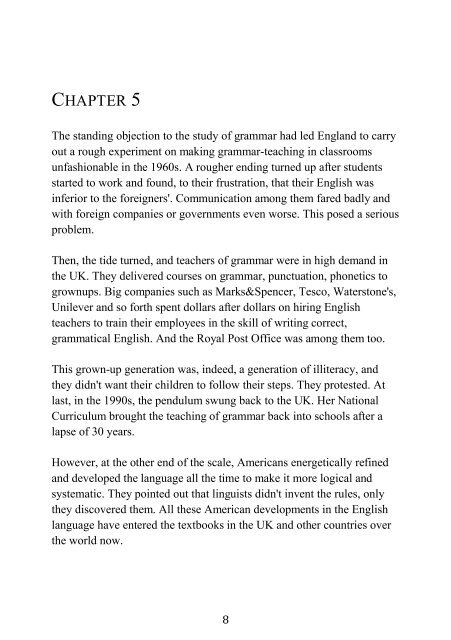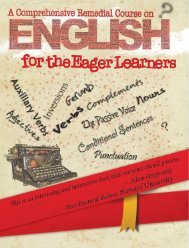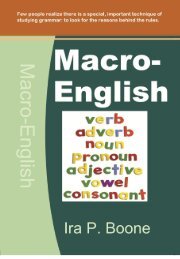Create successful ePaper yourself
Turn your PDF publications into a flip-book with our unique Google optimized e-Paper software.
CHAPTER 5<br />
The standing objection to the study of grammar had led England to carry<br />
out a rough experiment on making grammar-teaching in classrooms<br />
unfashionable in the 1960s. A rougher ending turned up after students<br />
started to work and found, to their frustration, that their <strong>English</strong> was<br />
inferior to the foreigners'. Communication among them fared badly and<br />
with foreign companies or governments even worse. This posed a serious<br />
problem.<br />
Then, the tide turned, and teachers of grammar were in high demand in<br />
the UK. They delivered courses on grammar, punctuation, phonetics to<br />
grownups. Big companies such as Marks&Spencer, Tesco, Waterstone's,<br />
Unilever and so forth spent dollars after dollars on hiring <strong>English</strong><br />
teachers to train their employees in the skill of writing correct,<br />
grammatical <strong>English</strong>. And the Royal Post Office was among them too.<br />
This grown-up generation was, indeed, a generation of illiteracy, and<br />
they didn't want their children to follow their steps. They protested. At<br />
last, in the 1990s, the pendulum swung back to the UK. Her National<br />
Curriculum brought the teaching of grammar back into schools after a<br />
lapse of 30 years.<br />
However, at the other end of the scale, Americans energetically refined<br />
and developed the language all the time to make it more logical and<br />
systematic. They pointed out that linguists didn't invent the rules, only<br />
they discovered them. All these American developments in the <strong>English</strong><br />
language have entered the textbooks in the UK and other countries over<br />
the world now.<br />
8




